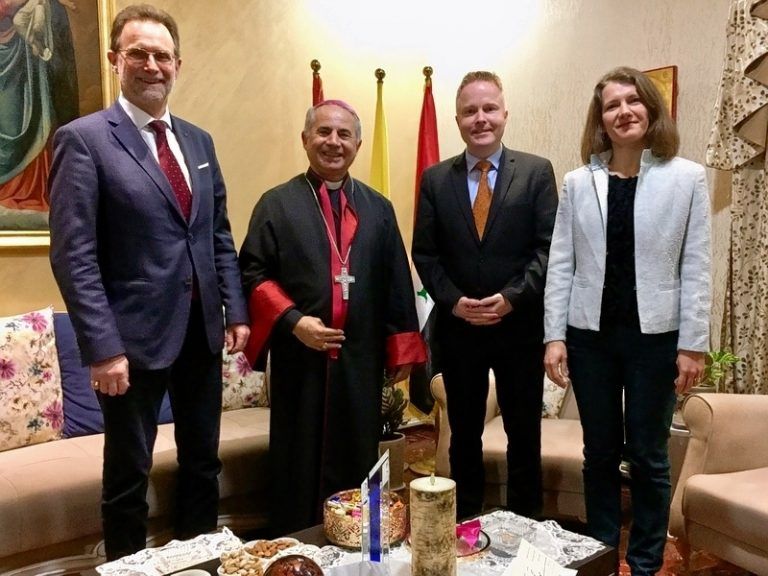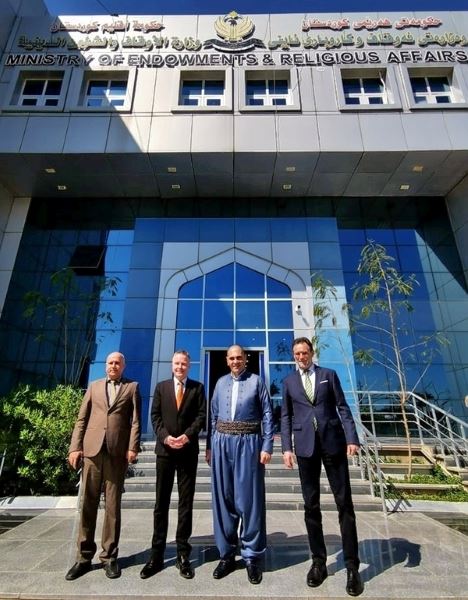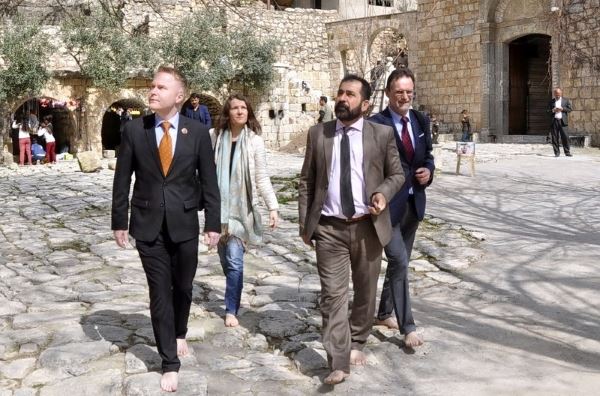Same blood and same tears

Working for Peace and Reconciliation in Iraq
Personal travel impressions of Michael Wolf, Vice Chairman of the ojcos-foundation
“We all have the same blood and the same tears,” explains Michael Najeeb, Archbishop of the Chaldean Church of Mosul in Erbil. He believes that humanity unites more deeply than ethnic or religious affiliation and is ready to cooperate with all people of good will. His church in Mosul, the capital of the Nineveh plain, has been destroyed. Because the situation there is still very precarious, especially at night, he resides in Erbil, 85 km from Mosul, and commutes about once a week to check on the few returning families of his church.
Seventh trip of a team from the ojcos-foundation
I spent a week in northern Iraq with Rahel Rasmussen, member of the Board of Trustees of our Foundation, and David Mueller to get to know our friends and partners after I took over responsibility for this special project at the end of 2019. This was the sixth trip for David Mueller, who has been employed by the ojcos-foundation as a Political Advocate for Religious Freedom in Iraq since January 2018. I could only marvel and with difficulty process the range of people we met. All people who stand up for their country and their people and whom David Müller got to know through tireless networking. It is our intention to connect people on a political level in Iraq and in Germany – advocacy, as it is called – in order to make the concerns of religious minorities in Iraq known to politicians and the public in Germany and to stand up for their protection. This commitment is vital to the survival of those responsible on the ground. “Humanitarian aid in the form of relief supplies and aid for reconstruction comes from many organizations. But we need your advocacy with your politicians and in the international community so that our government in Iraq and the Kurdish regional government treats the minorities well.” This support gives hope to our friends and encourages them in their commitment for their country.
Strengthening togetherness
We met ordinary priests, Protestant church leaders, archbishops, a minister of the Kurdish Regional Government, members of the Kurdish and Iraqi parliament, partners of Christian aid organisations and several representatives of domestic initiatives against corruption and for human and minority rights. They are all committed to the concerns of their country and to building a prosperous coexistence, even though they could often have an easier life abroad, just as many of their compatriots could. We want to encourage them to stay, listen to them, bring them together and, where possible, draw attention to them among politicians and decision-makers in Germany. Our regular visits show that there are now more such initiatives, cooperation has increased, and the otherwise frequent dissension among religious, denominational and ethnic groups is diminishing. This is a sign of hope, which is also confirmed to us by a representative of the Deutsche Gesellschaft für Internationale Zusammenarbeit (GIZ) GmbH, who is active on site in the field of civil peace service.
The meeting with the Archbishop Najeeb, a wise and warm-hearted spiritual man mentioned at the beginning, made us especially aware of the divisions of Iraq and the divisions of the Christian minority. On the one hand, we hear of the plight of many destroyed churches and villages and displaced people. Only few return because there is no perspective for life: “Aid money is there, houses are being rebuilt. But we need infrastructure and job opportunities in order to live. We lack trained leaders who can set in motion a hopeful development in society.” Nevertheless he looks with hope to the future of Christians in Iraq: “The roots of Christianity here are still alive and will not die. Even young people have a strong faith. The young demonstrators in Baghdad are searching for a real destiny as human beings and for an alternative.” Personally he adds: “We are not afraid. We have hope because we have our tradition, our prayers and friends in the world. We want to be ambassadors of hope.”

Commissioner for Religious Freedom and Peace
A visit to the Ministry of Endowments and Religious Affairs of the Kurdish Regional Government was impressive. The General Director of Christian Affairs introduced us to an important person responsible for religious freedom and social peace. It turned out that he comes from a particularly strict Muslim family from Halabja, a city that was attacked with poison gas in 1988 under the regime of Saddam Hussein. He lost his father and other members of his family in this attack. A victim of hatred and violence himself, he has become an advocate for religious freedom and understanding. Our new friend put it this way: “Leading personalities in the various social groups have a great responsibility to ensure that peace can be achieved between them.” We want to encourage such people and give their concerns a voice so that understanding and reconciliation can take place in this country. It is our hope and conviction that the Region Kurdistan-Iraq can be a model for this in the entire Middle East region. That is why it is important to support individual personalities with influence in this endeavour. The German government and the public can make a contribution to this.
With our Christian and Yazidi partners
With our Christian partners of CAPNI and Life Agape we experienced warm hospitality, safe company, competent advice and great goodwill. We are very grateful for them, their dedication and selfless service. This has helped us a lot, also their concern for our security, which was therefore never in danger at any time. We experienced that our efforts to come into contact with politicians also opened new horizons for our Christian partners and supported them in their commitment to help shape society.
For two days and two nights we were guests in the family of a member of the Yezidi prince family. Expelled from Mossul, he lives with his wife and children in a very simple house. He accompanied us during this whole time and shared everything with us. We gained rare insights into the otherwise very own and mostly closed world of this minority and saw what serious social setback they suffer. During our visit to their most important shrine in Lalish, we saw that even in this culture, which is little known to us, people seek peace, belonging, closeness and well-being. When I asked him what is at the centre of their religion, our host answered: “It is the peace that we all seek. And perhaps it’s good to know that no war has ever come from Yazidi.” In this basic humanity, we feel very close to them.

Reconciliation and mercy
The journey was a great broadening of horizons and learning experience – meeting so many people of different religious and cultural backgrounds, with different historical experiences, affects your own heart. It is clear to me as a Christian that understanding can only happen through reconciliation and forgiveness. The painful experiences we hear about are a challenge to my own readiness for reconciliation. What a long way to go in this society when I see how difficult it is sometimes for me, even here in Germany, to live reconciled with my neighbour. We want to continue on this path with our friends and partners in Iraq, in accordance with the principle of our foundation: “Building bridges through trust”.
More Articles:
- Believers between despair and hope
Pictures from our 7th trip to Iraq in March 2020 - From political centres of power to where there is no power
Impressions of an Journey to Iraq in August 2019 by Konstantin Mascher, Chairman of the ojcos-foundation - Impressions and encounters
Pictures from our 5th trip to Iraq in March 2019 - Is there a future for Christians and religious minorities in Iraq?
A description of the situation by Dr. Philipp W. Hildmann and David Mueller


